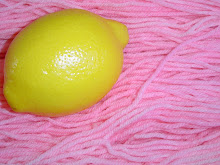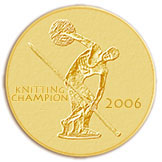The Lure of Useless Information
Instead of showing you another pink blob of the Chinese Lace Pullover, Highly Modified, I decided to talk about what I've been reading. Let me first preface this by explaining that I have a vast collection of information bouncing around in my head that the majority of society (and even knitters) would term "Useless Information." My BA is in Art History, which could just as easily be called Useless Information With an Emphasis of BS and Some Art to Make it Acceptable as a College Degree. But that just takes too long to say when someone asks you what your major is. It's also rather disheartening as a degree title to explain to your parents when you call to tell them you've changed your major. Again. For the fourth time and you're 3 1/2 years into the whole college thing. (Although Daddy's response when I told them I was going with Art History was, "What are you going to do with that?" For some reason, "I have no idea" wasn't particularly helpful to his way of thinking.)
Anyway, I have a well developed taste for useless information. This is probably why I find the Internet and Libraries so wonderful. (I could happily spend days just clicking on links in Wikipedia entries and wander all over the place as subjects go!) The other day we were at the book store and I was looking through the History section and I found In The Wake of the Plague: The Black Death and The World It Made, by Norman F. Cantor. Yep, I'm reading about the Black Death. It's actually an interesting book and while it discusses the diseases that were probably the cause of the event we call The Black Death (yes, it was more than one epidemic), it primarily emphasizes the changes that came about as a result of the plague in the mid fourteenth century and how those affected both Medieval society (particularly focusing on England) as well as the effects we still feel today. For instance, property law as it is practiced in the US today (being a former British colony, we kept many British ideas, even after The Revolution) was defined in large part in the late fourteenth and early fifteenth centuries, as a result of the devastation of the plague. Specific deaths of plague, and the results of who inherited what after these deaths, set events into place for the War of the Roses. As you can see, the interrelatedness of so many things and how they were affected by a devastating epidemic is just right up my alley. If you enjoy exploring the depths of useless information (which is nevertheless pretty interesting), you should check this book out of your library sometime.
Anyway, I have a well developed taste for useless information. This is probably why I find the Internet and Libraries so wonderful. (I could happily spend days just clicking on links in Wikipedia entries and wander all over the place as subjects go!) The other day we were at the book store and I was looking through the History section and I found In The Wake of the Plague: The Black Death and The World It Made, by Norman F. Cantor. Yep, I'm reading about the Black Death. It's actually an interesting book and while it discusses the diseases that were probably the cause of the event we call The Black Death (yes, it was more than one epidemic), it primarily emphasizes the changes that came about as a result of the plague in the mid fourteenth century and how those affected both Medieval society (particularly focusing on England) as well as the effects we still feel today. For instance, property law as it is practiced in the US today (being a former British colony, we kept many British ideas, even after The Revolution) was defined in large part in the late fourteenth and early fifteenth centuries, as a result of the devastation of the plague. Specific deaths of plague, and the results of who inherited what after these deaths, set events into place for the War of the Roses. As you can see, the interrelatedness of so many things and how they were affected by a devastating epidemic is just right up my alley. If you enjoy exploring the depths of useless information (which is nevertheless pretty interesting), you should check this book out of your library sometime.










14 Comments:
This type of info is never useless, always informative. It's the past that teaches us. I was pretty much the only one I know who read The Great Influenza (not surprisingly about the 'Spanish' flu of 1918.) It was fascinating in that it described the origins of modern medicine and vaccine. I read in that book probably the very first medical description of a condition we call SIRS (systemic immune response syndrome). It still happens today and in my line of work, we see it often enough. People would wake up feeling not so good and be dead by dinnertime.
This flu epidemic led to a hasty Treaty of Versailles, which may have influenced WWII. Vaccine that worked was developed. Knowledge of quarantine was gained (during war time, military camps were hot spots of infection and spread disease from HERE to Europe) Not a "Spanish Flu" at all-probably a midwest flu.
I am going to get this book you tout. Thanks, I love books like these. If you have the opportunity and love this kind of history, read The Great Influenza.
That book sounds great! I'll have to check it out.
The Black Plague is facinating, for some weird reason, to me. It sounds like an interesting book. I'll put it on my list. Thank you.
And NOTHING you learn is useless!!!
Ahh, information! I love it. I did a research paper during nursing school on The 1918 Flu Epidemic and the results it had on society with emphasis on public health issues. The Black Plague was very influential in making changes to society. I'll put your book on my list. Sounds very interesting.
it sounds like a good book, I may put it on my wishlist. I do have a vested interest though as I am a Microbiology student, so all things like that interest me - in fact there is a book out soon all about E. coli and I can't wait for it to be realised. I always thought the plague had been put down to Yestina pestis
Sounds like a consensus. We all agree the Black Death is not useless information, and if we refuse to learn from our past, we will most definitely repeat it. Besides, learning is life. At least, I think it is.
Cantor is a wealth of information and quite accessible. But if you want a really, really, useless degree get a Masters in Theology. Now I have found that history is very complicated and so is religion.
I'd like to recommend another incredibly interesting book that I read first during a course in the history of the "book". Leslie Howsam is a world expert on the subject and I got to study with her before she tootled off to Oxford. (yes, the Oxford) It's called, "The Great Cat Massacre" by Robert Darnton. It is a little gruesome but no more so than the medieval plagues (which by the way are part of the reason why we ended up as an urban industrialized culture...
Enjoy!
See, there is more than knitting, but reading can always trump knitting because you never have to unread like you have to frog! ; )
I'm reading The Great Mortality by John Kelly and it's fascinating! You may like it!
Year of Wonder by Geraldine Brooks is a wonderful historical fiction account of the effects of The Plague on a small English village. You might enjoy it.
What a delightful post! I, too, am enchanted by "useless information". It has come in handy at surprising times, though.
I've seen this book and been tempted, but haven't read it yet. One of my favorites is "Cathedral, Forge and Waterwheel", about major inventions. Only there's not enough in there about textile production. ;-) I have read "Year of Wonder" and liked it.
Haha!
Your useless information is my work. I'm a PhD student in the History of Medicine. I don't think my father commented much on my degree goals, especially since I started out as a literature major. If you love books about diseases just in general, or useless information
Crosby's "The Columbian Exchange" is truly my favorite. Its a little older but it talks about all the things America got from Europe and vice versa. Kentucky Bluegrass is from Europe! Who knew!
I see potential for an entirely different blog here...
: ] Mindy
Ha! My DH is known around here as the FoUI (Fount of Useless Information) because he remembers all kinds of stuff that normal people forget. It's gotten so that work expects him to always know the answer to random questions. I dunno how much he knows about the Black Death though. I may have to get this book myself.
What a small world! Like Samantha from the comments, I am also a history of medicine PhD and have recently read Crosby's Columbian Exchange. My current project(s) focus on disease in the US during the New Deal; not exactly the era of the plague, but if you're interested I can give you a list of books you might like!
Post a Comment
<< Home